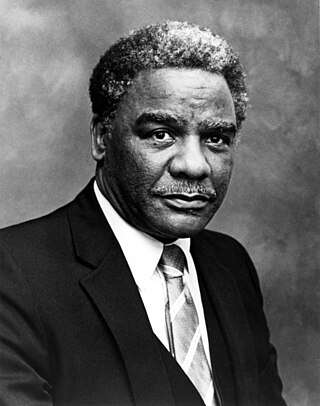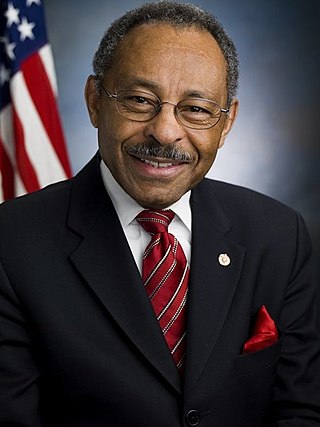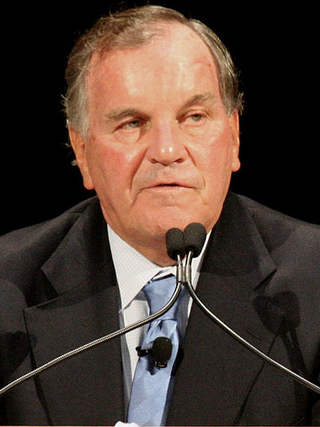
Jane Margaret Byrne was an American politician who served as the 50th mayor of Chicago from April 16, 1979, until April 29, 1983. Prior to her tenure as mayor, Byrne served as Chicago's commissioner of consumer sales from 1969 until 1977, the only female in the mayoral cabinet.

Harold Lee Washington was an American lawyer and politician who was the 51st Mayor of Chicago. Washington became the first African American to be elected as the city's mayor in April 1983. He served as mayor from April 29, 1983, until his death on November 25, 1987. Born in Chicago and raised in the Bronzeville neighborhood, Washington became involved in local 3rd Ward politics under Chicago Alderman and future Congressman Ralph Metcalfe after graduating from Roosevelt University and Northwestern University School of Law. Washington was a member of the U.S. House of Representatives from 1981 to 1983, representing Illinois's first district. Washington had previously served in the Illinois State Senate and the Illinois House of Representatives from 1965 until 1976.

The Cook County Democratic Party is an American county-level political party organization which represents voters in 50 wards in the city of Chicago and 30 suburban townships of Cook County. The organization has dominated Chicago politics since the 1930s. It relies on an organizational structure of a ward or township committeeperson to elect candidates. At the height of its influence under Richard J. Daley in the 1960s when political patronage in employment was endemic in American cities, it was one of the most powerful political machines in American history. By the beginning of the 21st century the party had largely ceased to function as a machine due to the legal dismantling of the patronage system under the Shakman decrees issued by the federal court in Chicago. The current Chair is Toni Preckwinkle, who is also the elected Cook County Board president.

The Chicago mayoral election of 2007 saw incumbent mayor Richard M. Daley win a landslide victory, garnering a 51-point margin of victory.

The Chicago mayoral election of 1995 resulted in the re-election of Democratic Party nominee incumbent Richard M. Daley over independent candidate Roland Burris, with 359,466 votes to Burris's 217,024. Daley won 60.1% of the total vote, winning by a landslide 24-point margin. The Republican candidate, Raymond Wardingley, fared poorly with only 2.8% of the vote. A fourth-place candidate, Harold Washington Party nominee Lawrence Redmond, won 0.9% of the votes.

The Chicago mayoral election of 1991 resulted in the re-election of incumbent Democrat Richard M. Daley to his first full-term. Daley had previously been elected to serve the remainder of Harold Washington's unexpired term in a special election held following Washington's death in office.

The Chicago mayoral election of 1989 saw Democratic nominee Richard M. Daley win election to the remainder of an unexpired mayoral term with a 14% margin of victory. This marked a return for the Daley family to the office of mayor. Daley was elected over Alderman Timothy Evans, the nominee of the newly formed Harold Washington Party, and the Republican nominee Ed Vrdolyak.

The Chicago mayoral election of 1987 was first the primary election on February 24, 1987 followed by the general election on April 7, 1987. The election saw the re-election of Chicago, Illinois' first African-American mayor, Harold Washington. Ed Vrdolyak, the leader of the Vrdolyak 29, unsuccessfully opposed him, running on the Illinois Solidarity Party ticket. Former mayor Jane Byrne, who served from 1979 until 1983 unsuccessfully challenged Washington in the Democratic primary.

The 1979 Chicago mayoral election was first the primary on February 27, 1979, which was followed by the general on April 3, 1979. The election saw the election of Chicago, Illinois' first female mayor, and the first female mayor of any major American city, Jane M. Byrne. Byrne defeated Republican Wallace Johnson by a landslide 66 percent margin of victory, winning more than 82 percent of the vote. Byrne's 82% of the vote is the most any candidate has received in a Chicago mayoral election.

Jesús G. "Chuy" García is an American politician serving as the U.S. representative for Illinois's 4th district since 2019. A member of the Democratic Party, he served on the Cook County Board of Commissioners, as well as in the Illinois Senate and on the Chicago City Council before his election to Congress. He was also a candidate for mayor of Chicago in 2015 and 2023. Throughout his career in Chicago and national politics, he has been described as a progressive.

The Chicago mayoral election of 1977 was a special election held on June 7, 1977 to complete the remainder of the unexpired mayoral term of Richard J. Daley who died of a heart attack in December 1976. The election saw Interim Mayor Michael A. Bilandic win the election. Bliandic defeated Republican Dennis H. Block by a landslide 56% margin.

The Chicago mayoral election of 1975 was held on April 1, 1975. Democratic Party incumbent Richard J. Daley was elected to a record sixth term as mayor by a landslide 59% margin over Republican nominee John J. Hoellen Jr. Only one other individual has since matched Daley's feat of winning six Chicago mayoral elections. This was the first Chicago mayoral election since the ratification of the Twenty-sixth Amendment to the United States Constitution, which lowered the voting age from 21 to 18.

Chicago has held regularly-scheduled popular elections to select the city's mayor ever since it was incorporated as a city in 1837.

The Chicago mayoral election of 1971, held on April 6, 1971, was a contest between incumbent Democrat Richard J. Daley and Republican Richard E. Friedman. Daley won by a landslide 40% margin, and it was his fifth consecutive mayoral win, the longest serving mayor of Chicago until that time.

The Chicago mayoral election of 1963 was held on April 2, 1963. The election saw Richard J. Daley elected to a third term as mayor, defeating Republican Ben Adamowski by a double-digit margin.

The Chicago mayoral election of 1959 was held on April 7, 1959. The election saw Richard J. Daley being elected to a second term as mayor by a landslide margin of more-than 40%.

The 1955 Chicago mayoral election saw Democrat Richard J. Daley win election to his first term as mayor by a ten-point margin over Republican Robert E. Merriam. This was the narrowest margin of victory of any of Daley's mayoral races.

The Cook County, Illinois, general election was held on November 3, 2020. Elections were held for Clerk of the Circuit Court, State's Attorney, Cook County Board of Review district 1, three seats on the Water Reclamation District Board, and judgeships on the Circuit Court of Cook County.

The Cook County, Illinois, general election was held on November 6, 1990.

In the 1980 Cook County State's Attorney election, incumbent second-term state's attorney Bernard Carey, a Republican, was unseated by Democrat Richard M. Daley.

















